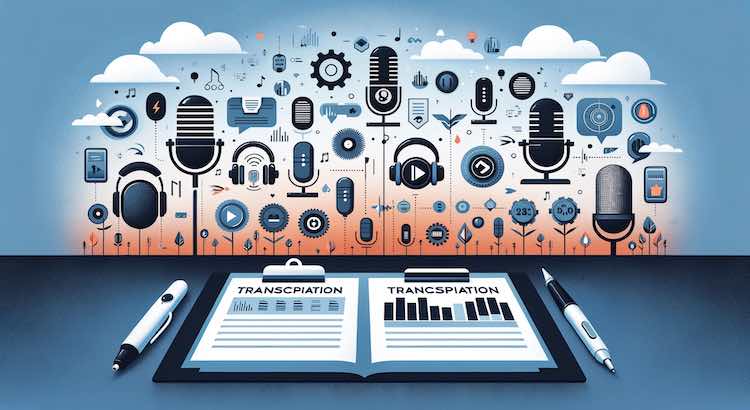Podcasts are more popular than ever, with millions of episodes produced each year (Edison Research, 2023). As more creators enter this space, the need for accurate and fast transcription tools grows. Good transcription makes your podcast accessible, increases search engine visibility, and helps repurpose content for blogs or social media. This guide compares the leading transcription tools for podcasters, focusing on features, accuracy, and pricing. We'll also look at how affordable [transcription services](https://gotranscript.com/transcription-services) like GoTranscript can help you reach a wider audience.
Why Podcast Transcription Is Essential
Transcribing your podcast can transform your reach and accessibility. Here’s why so many podcasters use transcription:
- Accessibility: Transcripts make your show available to people who are deaf or hard of hearing. In the United States, around 15% of adults have some hearing difficulty (CDC, 2020).
- SEO Benefits: Search engines can’t “listen,” but they do read text. A transcript lets more people find your podcast through search (Search Engine Journal, 2022).
- Content Repurposing: You can use transcripts for blog posts, newsletters, e-books, or quotes for social media, saving time and effort.
Top 5 Podcast Transcription Tools Compared
1. Otter.ai
- Features: Otter.ai uses artificial intelligence (AI) to provide real-time transcription. You get speaker names, keyword summaries, and the ability to edit and share transcripts easily.
- Accuracy: Otter.ai works best with clear audio and minimal background noise. It reports around 85%–95% accuracy for most English speakers (2023).
- Pricing: A free plan offers limited minutes. Paid plans add more transcription time and more advanced tools. This makes Otter.ai a good choice for budget-conscious podcasters starting out.
2. Rev
- Features: Rev offers both human and AI transcription. Human transcription includes verbatim transcripts, speaker labels, and timestamps.
- Accuracy: Its human service delivers more than 99% accuracy, among the highest in the industry (2023).
- Pricing: Rev’s AI transcriptions are affordable, but human transcription costs more, billed per audio minute. It may be better suited for podcasters who prioritize accuracy over cost.
3. Descript
- Features: Descript is an all-in-one platform for transcript creation and audio editing. You can edit audio simply by editing text—an easy way to clean up your episodes.
- Accuracy: Its AI-driven transcription offers up to 95% accuracy, and you can manually correct errors for a perfect transcript (2023).
- Pricing: Descript uses subscription pricing with various tiers based on usage. Each plan comes with a set number of monthly transcription hours and extra charges for more.
4. Temi
- Features: Temi offers fast automatic transcription with a simple interface. It provides speaker separation and time stamps to keep everything organized.
- Accuracy: Temi returns quick results, but accuracy may drop with poor audio or strong accents, often ranging from 80%–90% (2023).
- Pricing: Temi charges a low per-minute rate, keeping it affordable for long podcast episodes or frequent uploads.
5. Sonix
- Features: Sonix provides transcription, [audio translation services](https://gotranscript.com/audio-translation-services), and subtitle creation all in one. Collaboration and editing tools are included, useful for team projects.
- Accuracy: Sonix reports high accuracy with good audio, often reaching up to 95%. Its editor lets you quickly fix mistakes.
- Pricing: Sonix has a competitive per-minute price that drops for bulk usage, making it good for podcasters with large archives.
What to Look for in a Podcast Transcription Tool
Choosing the right transcription solution depends on your specific needs. Ask yourself the following questions:
- How Important Is Accuracy? Human services cost more but produce the most accurate transcripts. AI tools are faster and cheaper but may need more proofreading. Consider [transcription proofreading services](https://gotranscript.com/transcription-proofreading-services) if you need perfect results.
- How Fast Do You Need Transcripts? Automated [AI transcription subscriptions](https://gotranscript.com/ai-transcription-subscription) can deliver transcripts in minutes. Human services can take several hours to a day.
- Do You Need Extra Features? Some services offer full audio editing, [closed caption services](https://gotranscript.com/closed-captioning-services), or [subtitling services](https://gotranscript.com/subtitling-services) for videos.
- Is the Platform User-Friendly? A simple, clean interface helps save time. Look for tools that make it easy to [order transcription](https://gotranscript.com/upload/transcriptions) or [order captions](https://gotranscript.com/upload/captions).
- What’s Your Budget? Prices vary. Consider the [transcription pricing](https://gotranscript.com/cheap-transcription-rates) and [captioning services pricing](https://gotranscript.com/cheap-captioning-rates) for each option.
Comparing Transcription Approaches
Human vs. Automated Transcription
- Human transcription: Provides the highest accuracy, especially with complex audio, multiple speakers, or heavy accents. Great for final publishing.
- Automated (AI) transcription: Best for quick drafts, editing, or when you need instant turnaround. May need some correction for best results.
Multi-Language and Accessibility Options
- If your audience is global, look for services offering [text translation](https://gotranscript.com/text-translation-services) and captions in different languages.
- [Closed caption services](https://gotranscript.com/closed-captioning-services) and [subtitling services](https://gotranscript.com/subtitling-services) can help reach new listeners on platforms like YouTube and Facebook.
Conclusion
Great podcasts reach more people with clear, reliable transcriptions. Whether you want the speed of AI, the top accuracy of human review, or extra tools for editing and translation, the right transcription service will save you time and expand your reach.
GoTranscript offers both [human and automated transcription services](https://gotranscript.com/transcription-services) to fit your podcast’s needs and your budget. You can get accurate transcripts, fast [AI transcription](https://gotranscript.com/automated-transcription-services), as well as [proofreading](https://gotranscript.com/transcription-proofreading-services), [translation](https://gotranscript.com/text-translation-services), and [captioning services](https://gotranscript.com/closed-captioning-services). Flexible [pricing](https://gotranscript.com/cheap-transcription-rates) and a [simple ordering process](https://gotranscript.com/upload/transcriptions) make it easy to get started.
Choose a service that helps your podcast grow—explore GoTranscript’s solutions for podcasters today.


 Transcription
Transcription
 Captions (FCC/SDH)
Captions (FCC/SDH)
 Transcript Editing & Proofreading
Transcript Editing & Proofreading
 Translation (text/audio/images)
Translation (text/audio/images)
 Subtitles
Subtitles
 Video Description (AD)
Video Description (AD)









